 Properties and Powers is an 19th century science primer for children. It might seem churlish to criticise such a well-meant endeavour at this distance of time, but I'm prepared to risk the catcalls.
Properties and Powers is an 19th century science primer for children. It might seem churlish to criticise such a well-meant endeavour at this distance of time, but I'm prepared to risk the catcalls.
I haven't been able to identify the "A Corey" who wrote it, but I note that the copyright is claimed by an Anna E Baldwin. Possibly these are one and the same person, with Corey being her maiden name or other nom de plume.
Whoever Corey was, her work gives the impression of a kindly but muddle-headed individual, somewhat out of her depth: not as ungrammatical nor cranky as Frank Nimrod, but of a similar disposition, prepared to waffle on any subject however little they know about it. Corey is also easily distracted and digressive, and as a result any child given this book to study might be forgiven for feeling slightly light-headed after a while. As teaching aids go, it'll make a great door-stop.
Here's a passage which will give you a flavour of how Corey starts with an idea and meanders away from it:
You know there is extension, and places for things. As matter has length, breadth, and thickness, there must be a placing of each particle. All the modifications of air, water and earth have space. There is nothing too large, and there is nothing too small for a place; and all things in creation have their places. If we take our map and find how many places there are on it which we have never visited, it will show us what strangers we are to our own planet.. There is land where water never freezes, where the sun scorches with heat; and other parts where the ice never melts, where half the year is day and half the year is night. So our home feeling and our stranger feeling depend altogether upon the property of place. And it is a fact that the whole period allotted to human life can be expended in only approximating to some knowledge of this earth where we find ourselves, and call our home. The inhabitants astonish each other by the differences displayed by those in other parts of it, when they are brought together. But each set of them, we observe, has learned to love the place where they first found themselves. And sometimes it would be the greatest hardship to change to other places, where every thing is new. But as we all have intelligent aspirations, there must be a central point in which they meet. The grave is the portal, as that must be entered, for we all die, and beyond that our desires all converge to the absolutely good, or the absolutely bad. We can carry the property of place no further.
 Dizzying, isn't it? Here's another example, a priceless description of how galvanism was discovered:
Dizzying, isn't it? Here's another example, a priceless description of how galvanism was discovered:
Madam Galvani observed convulsions in a dead frog, which laid near an electrical machine which was in action. Although there is a diversity of information as to whether it was she or a student who noticed the incident first. As she is said to have been an invalid, and the frogs were for her benefit, it is more than likely she had an eye on them, and it would not be strange if they both saw the convulsions at the same time. However, the subject was investigated by Dr. Galvani, who was a Professor of Anatomy, and they found that. a knife touched the frog, and that when a metallic substance in contact with a nerve of the creature, was brought within the action of the electrical machine, there followed a twitching of the limb. And since that time a great many discoveries have been made about all this, and a machine constructed, called the Galvanic Battery; the principle of it, being that when two metals are connected by some substance capable of exciting their different electricities, similar effects to these described may be observed. Charges from the battery will occasion contortions and violent jerkings in dead corpses, which are rather horrible to witness. After the skin has been removed from the hind legs of frogs and some salt sprinkled over them, (while they are raw of course), the legs will quiver and jerk in a curious manner, occasioned by the action of the salt upon them. It is likely that Madam Galvani was going to have the frogs for her dinner. They have a taste between fish and chicken; you broil them over the fire, and then put a little sprinkle of salt, and the least dust of pepper, if any at all, then you will have delicious morsels. It is not necessary to cook them out of doors; building fires is a dangerous employment for children, and if you ever have any, bring them into the kitchen, and do the cooking there, where you can get help if you should need it. A word more about that pepper. Pepper, spice and other irritants, should be used with caution, if used at all, for the effect of them is to excite the coating of the stomach, and lead eventually to disease. In concluding about the battery alluded to, it is capable of producing great quantities of electricity; there is a positive pole and a negative pole,—the positive pole attracts a negative pole, and a negative pole attracts a positive pole. These terms, positive and negative, express different quantities of the fluid, positive being more, and the negative less. The term pole, in this connection, meaning point; point of concentration. Exactly how the metals are arranged in a pile, and the vessels with acid and water, and so on, are adjusted, is explained in works on the subject. We have learned so much of the ways of electricity, that we cannot be surprised as our predecessors were, even if dead bodies jerk and thump around. They have, by tracing remarkable phenomena, which astonished them, elucidated them and placed them where they belong, under and within this property of matter.
"Dead corpses", eh? The best kind. One may reserve the right to be surprised when they "jerk and thump around" though. It may put you off your alfresco frog's legs supper. (Or jerk chicken).
This is far from the only example of cookery writing in the book. The final section, titled "Chemical Attraction", consists of little else, apart from some stuff about birds. Oh, and music. What else would one expect? Perhaps the publisher suggested she should cover the subject of chemistry but since she didn't know anything about it, she wrote about bread-making and biscuits instead. There's no attempt to describe any chemical processes involved, though it does tell you how to feed a calf. Here's how this section begins:
It was mentioned in the first part of this book, that there was an extension of Chemical Attraction, designed to interest young people in the art and practice of cookery. So here it is. The property alluded to covers the ground of cookery; in fact, takes in every story of the house, from the roof to the floor of the cellar. So if we spend a while in the kitchen with it, it will not hurt any of us. And we often get encouragement from what others have done, when we are just going to think that it will be impossible for us to do this and that particular work. There are the old words of "try again,' good now as ever. In these culinary pages which might be dry without them, to some of you, first there is a fancy picture, representing a Spoonbill bird with a musical basket, employed here as in the right place. As there are harmony and discord in the world, every one is supposed to try a hand at it. So in the fancy picture of the spoonbill and the musical basket, you can take the notes and arrange them to suit yourselves. And as spoons go a great way in the concord of culinary operations, a spoonful too much, or too little, or a spoonful of the wrong material, being the means of great confusion sometimes, the picture indicates the opportunity there is to have harmony or discord. And it can be appropriately taken for this heading. And there follow some illuminations with other birds, which make it more interesting than it would be without them.
When the ship, the Great Eastern, a picture of which you can find in the encyclopedias, was on exhibition in the waters of New York, and multitudes of people flocked to see the ship, its mammoth proportions were viewed, and opinions expressed, and recollections of just how it all looked were retained. There was one part of the show, probably thought that they were unobserved; altogether overshadowed by the great ship. It was the jolly crew, running around and preparing their own dinner in large dishes of peeled potatoes and beef. Sailor boys have to prepare their own food, because there is no one to do it for them, and so they become adepts. It would not hurt land boys to take up the subject. The ship itself is a historic ship; it was used in laying the Atlantic Telegraph Cable, and is ever memorable for that, and for being the largest one built in modern times. Those who saw it here at the time of the visit, concluded that it was magnificent in size; if that was needed. But it has proved too large for rapid sea voyages, and requires too much fuel for economy and safety.
As Corey says in the conclusion to her volume:
The pen with which we write, more powerful than the sword, because it is the medium of intelligence, it strikes the mind without hewing its way through the body to paralyze it.
In other words, never mind paralyzing the body, when you can do the same to the mind. Just what is wanted in a children's author, eh?

But isn't it worth looking
Interesting thought, Ion.
Interesting thought, Ion. Perhaps the author may simply have been a non-native speaker, like the great Nimrod.
But what a beautiful binding
I wouldn't trust the
I wouldn't trust the information in this book, Ned. A one-woman wikipedia.
Annapedia? Huh, looks like
Thank you so much for this
To every spoonbill its own
To every spoonbill its own musical basket. That's my hope for the future.
Is this poorer written or
If you think this is boring,
If you think this is boring, then I suggest you get a copy of Birth Control is Sinful in the Christian Marriages and also Robbing God of Priesthood Children!! It makes logarithmic tables seem positively thrilling by comparison.
It's 160$! How the heck could
I didn't pay that. You can
I didn't pay that. You can get it for £30 from the publisher. But it was still far, far too much.